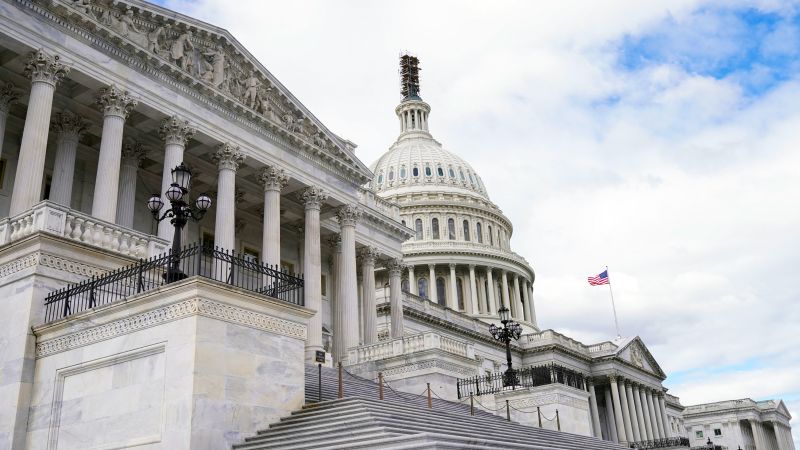If House Republicans elect hard-charging Jim Jordan as speaker on Tuesday, they will be picking an election denier who is known for working to shut down the government rather than running it.
The party would be ending its two-week speakership debacle, but it’d be elevating a ringleader in former President Donald Trump’s attempt to overthrow the 2020 election into a position that is second in the line of succession behind President Joe Biden.
A Jordan speakership would represent a huge victory for Trump, given the Judiciary chairman’s record of using his power to target Democratic presidential candidates, including Biden and 2016 nominee Hillary Clinton. Before the midterm elections last year, for instance, Jordan said at the Conservative Political Action Conference that he’d use probes into the Biden administration to “frame up the 2024 race” for Trump.
He has been as good as his word, working to highlight the ex-president’s claims that the federal government has been “weaponized” against him in an effort to distract from the four criminal trials the GOP front-runner is now facing. And Jordan has been a prominent player in the impeachment investigation opened against Biden, despite the failure of the GOP to provide evidence that the president personally profited from the business ventures of his son in places like China and Ukraine.
Jordan’s hopes of becoming speaker increased dramatically over the weekend as he began to turn holdouts amid an intense lobbying campaign. Some key moderates who had previously said they wouldn’t back the Ohio Republican had changed course by Monday. But given the tiny House GOP majority, Jordan can lose only four Republicans and still win the job in a vote in the full House, which is expected at noon on Tuesday.
Several high-profile dissidents still insist they will only vote for former Speaker Kevin McCarthy or are firmly against Jordan, who co-founded the conservative Freedom Caucus that was instrumental in the demise of the last three Republican speakers. Jordan’s opponents have cited his role in the run-up to the January 6, 2021, insurrection – when he discussed plans to object to the results – and have concerns that his hardline positions could alienate crucial swing voters next year.
If Jordan wins the speakership, his reputation for resistance to compromise is likely to immediately fuel fresh fears of a government shutdown caused by Republican demands for massive spending cuts. Facing a right-wing revolt, McCarthy was forced to use Democratic votes to pass a stopgap funding measure. And he paid for his effort to stave off a national crisis, which could have hurt millions of Americans, with his job. Jordan has been among the right-wing Republicans who want to use their power to bulldoze through their agenda despite the fact that Democrats control the Senate and the White House.
As speaker, Jordan would be in control of half of one of the three branches of the US government – a role that confers duties to the Constitution and the national interest far greater than those that weigh on individual members. By definition, he’d be an insider after years as an insurgent, a switch that could be a challenge. Fellow Ohioan and former Republican House Speaker John Boehner told CBS News in a 2021 interview referring to Jordan: “I just never saw a guy who spent more time tearing things apart – never building anything, never putting anything together.”
A Jordan victory would mark one of the most significant milestones in Washington Republicans’ embrace of an extreme right-wing populist, nationalist ideology that is more dedicated to tearing political institutions down than using them to forge change. And it would reward the eight Republicans who voted with Democrats to topple McCarthy. More broadly, it would remove power from the party’s traditional Washington, DC, political establishment, which many of the party’s grassroots voters despise, and place the Freedom Caucus at the pinnacle of power in the House.
The shift toward Jordan over the weekend, however, may also reflect a realization by lawmakers that the optics of continued chaos in the House are disastrous for the party and sends a message of American weakness amid a raging crisis in the Middle East.
New York Rep. Marc Molinaro, who represents a district Biden would have won in 2020 under redrawn lines, announced Monday evening that he’s backing Jordan. “What I care deeply about is getting back to governing. And having been home over the weekend, I can tell you that most people I talk to just want us to fight inflation, just want us to secure the border, just want us to govern on their behalf. And truly they just want this House to function,” he told CNN.
And if there is anyone who could keep far-right flamethrowers in line, it is Jordan. After all, he’s one of them. If wins the speakership, he’d potentially face a choice whether to at least seek a modicum of governance to show voters that the GOP can get results ahead of the 2024 election. Just as President Richard Nixon had the political cover as a hardline anti-Communist to forge an opening to Maoist China, Jordan might have more leeway than other potential Republican leaders to make painful concessions and keep his hardliners in line.
But choosing Jordan to end the impasse would also represent a huge risk for the GOP. His close alliance with Trump, who has endorsed the Ohio Republican for the top job, could alienate moderate voters in districts that paved the way to the party’s narrow majority in last year’s midterms. His record of full bore confrontation could exacerbate a showdown with the Democratic Senate and the White House over spending that could shut down the government by the middle of November and cause a backlash against Republicans.
And the qualities that his supporters see in Jordan – the fearsome use of power to drum up investigations against political opponents and a pugilistic refusal to find middle ground – are not those traditionally associated with successful speakers. Jordan has no history of bringing disparate factions of his party together – quite the opposite. His brand of politics is built around his history as a champion wrestler in college. “I look at it like a wrestling match,” Jordan told the New York Times earlier this year, referring to his staccato interrogations of witnesses in hearings that made him a hero on conservative media and a Trump favorite.
Another knock on Jordan is that he’s not known as a prolific fundraiser – one of the most important jobs of a party leader in the House. McCarthy was known for his lucrative hauls that he used to boost candidates and foster loyalty from his supporters. In fact, Jordan has actively worked against some fellow members in the past, with the political arm of the Freedom Caucus backing primary challengers to 10 GOP incumbents over the last few cycles.
The job of the House has traditionally been to pass laws. And by that measure, Jordan is one of the least effective legislators of his generation, according to the Center For Effective Lawmaking, a joint project of the University of Virginia and Vanderbilt University.
Still, Jordan’s supporters worked to mitigate his liabilities heading into a floor vote that would force opponents to publicly renounce him at the risk of drawing primary challenges. House Armed Services Chairman Mike Rogers of Alabama, who had been vehemently anti-Jordan, flipped after what he described as “two cordial, thoughtful and productive” conversations with the prospective speaker and securing his support for a strong defense bill. Sources familiar with Jordan’s pitch to the GOP conference told CNN’s Annie Grayer and Melanie Zanona Monday that the Ohio congressman had promised to fundraise hard for Republicans across the country and that he would also do what he could to protect moderates – potentially by ensuring that they don’t face primary challenges next year from hardline pro-Trump candidates.
However, Zanona and Grayer also reported that some big GOP donors had vowed not to invest in the House majority under Jordan and would instead concentrate their resources on flipping the Senate next year. That GOP coolness highlights how a 2024 Republican slate featuring Trump, the front-runner for the presidential nomination, and Jordan as the most powerful Republican in Washington could delight Democrats campaigning in the battleground districts that could decide the election.
Rep. Don Bacon, who represents a swing district in Nebraska, emerged from a meeting of Republican lawmakers on Monday evening resolved not to support Jordan, after expressing concerns that handing him the speaker’s gavel would represent a victory for the hardliners who ended McCarthy’s tenure. Bacon said he was inclined to vote for McCarthy even though the former speaker is not standing, at least in a first ballot. “I’m going to vote tomorrow and we’ll take it after that one at a time,” Bacon said.
Another anti-McCarthy holdout is Rep. Ken Buck of Colorado, who has said “part of” the reason he is opposed to Jordan is his behavior after the 2020 election. According to the House select committee that investigated the January 6, 2021, attack on the US Capitol, Jordan was a “significant player” in Trump’s efforts to overturn the election and to block the certification of Biden’s victory in Congress, including in multiple conversations with Trump and senior White House officials.
But some key lawmakers appear to have made their peace with Jordan’s potential speakership, partly because of the damage being done to the GOP and their potential reelection prospects by self-indulgent internal battles. New York Rep. Mike Lawler, a freshman who is one of the most endangered Republicans next year and has been a strong supporter of McCarthy, called on the House to get back to work. “At the end of the day, we need to get back to the work of the American people,” Lawler told CNN’s Jake Tapper on Monday. He said he told Jordan on Friday that he was not a “hell no” and that he’d only back him if he had the votes to become speaker.
He shrugged off attacks that are already coming from Democrats over his possible vote for Jordan.
“They are going to attack me no matter what I do. That’s their job, that’s their objective. They want to get back into the majority,” Lawler told Tapper.
“My constituents know who I am, they know where I stand on these issues,” Lawler said, noting how he had fought to raise the government’s borrowing limit earlier this year, averting a debt default, and to keep the government open.
Lawler might be right. But the potential chaos and discord Jordan could sow may give voters fresh reasons to vote against Lawler by November of next year.
Read the full article here







